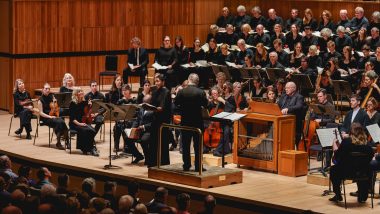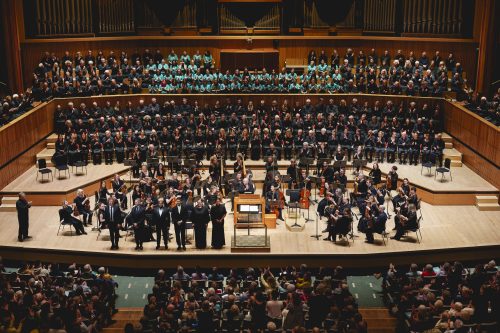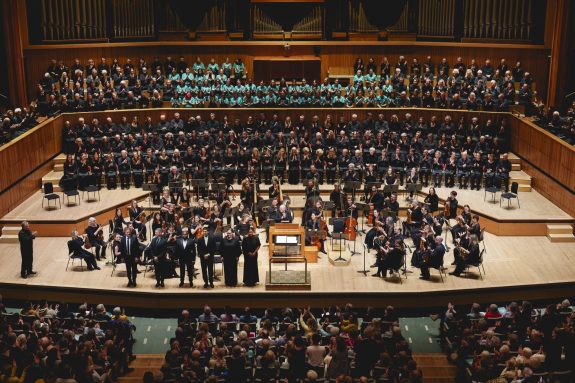 United Kingdom Bach: Soloists, The Bach Choir, London Youth Choirs, Florilegium / David Hill (conductor). Royal Festival Hall, London, 17.3.2024. (AK)
United Kingdom Bach: Soloists, The Bach Choir, London Youth Choirs, Florilegium / David Hill (conductor). Royal Festival Hall, London, 17.3.2024. (AK)

Bach – St Matthew Passion, BWV 244
Ed Lyon – Evangelist
Simon Shibambu – Christ
Nardus Williams (soprano)
Jennifer Johnston (mezzo-soprano)
Joshua Ellicott (tenor)
Roderick Williams (baritone)
With Easter approaching, performances of Bach’s St Matthew Passion are numerous worldwide. Without deliberately looking for any performance, for the period of 17th March leading up to Good Friday I noticed five performances in and around London and two in Budapest. Some are performed in concert halls, some in churches. The question arises whether secular or ecclesiastical environment serves better this masterpiece of all times. Do we worship or do we attend a concert performance?
According to their longstanding tradition, The Bach Choir presented a full-on performance at their Royal Festival Hall concert. With over two hundred and fifty singers and fifty-four instrumentalists on stage, they created a momentous event for the fully packed Festival Hall audience. It was performed in English and the orchestra used baroque instruments.
However, they also tried to keep ecclesiastical respect which, in my view, did not work. At the outset, the audience was asked not to applaud until the very end (that is on conclusion of Part Two). Indeed, conductor David Hill brought Part One to an end with remarkable skill, keeping everyone silent. But then followed a two-hour interval, for all to make merry if they so wished: Jesus was betrayed and arrested but we went out for lunch.
I am not certain how the secular versus ecclesiastical are mixing in other performances but Bach must have assumed a sermon in the middle, delivered between Parts One and Two. This is how Salamon Kamp and his forces presented the Passion a year ago and will present it again this week in a Lutheran church in Budapest. No interval but a sermon in the middle and communal reciting of The Lord’s Prayer after Jesus dies (on conclusion of No.71). No applause at the end either, only a short communal prayer.
First performed within a Good Friday church service on 11th April 1727 at the Leipzig Thomaskirche, St Matthew Passion has entered the concert repertoire a hundred years later after Mendelssohn’s discovery and revival of the composition. So, thanks to Mendelssohn, concert performances are most welcome but perhaps in concert halls we should be allowed to applaud the performers.

There would have been plenty to applaud at The Bach Choir’s concert. The choir was fully disciplined and fully in tune; this is not to be taken for granted as choirs – whether amateur or professional – do lose pitch from time to time: especially when so many people are spread quite far from each other. It was great to see and hear about thirty young people from London Youth Choirs, placed in the middle of The Bach Choir and sounding beautiful. After the Evangelist (Ed Lyon) announced Jesus’s death with great sensitivity, the combined chorus sang Choral No.72 from memory, acapella and in hushed but clearly audible pianissimo: the tonal quality perfectly matched the tragedy of the story.
Throughout the performance conductor David Hill seemed to aim more for gentle, respectful choral story telling than for bombastic effects. Nevertheless, when the narrative demanded, we did get the passion of the Passion.
All solo singers delivered their parts with utmost professionalism but two, in particular, caught my ears: soprano Nardus Williams and tenor Joshua Ellicott used their beautiful voices for nuanced phrasing and dynamics as well dramatic storytelling. Baritone Roderick Williams is a consummated artist with integrity, knowledge, and musical intelligence. However, to my ears, he is a baritone, not a bass. Here he was tasked to sing many low notes which might have been easier for a bass. However, I hasten to add, anything Williams sings is as beautiful as tasteful … even if some low notes are out of his range.
Florilegium, the orchestra contributing to this occasion, was magnificent. They may not use the same players at each of their concerts but the ensemble within and between Bach’s double orchestras was exemplary. They know how to play Baroque and they played with style, beauty, and virtuosity. Flute player Ashley Solomon, violin soloists Julia Bishop and Bojan Čičić were excellent soloists as well as leaders. The cello continuo was delivered with style, stamina, and unfailing support by Jennifer Morsches. Philip Scriven was rock solid on his small organ, playing continuo and all, in the middle of the stage. However, I kept wondering what it would be like to have the Festival Hall’s organ added to some of the Passion music presented by the almost three hundred performers onstage.
During the final chorus I kept thinking whether the solo singers could have joined in; arguably, the communal spirit – very much in evidence within The Bach Choir as well as within their fateful audience – would have been much enhanced. Six solo singers sitting silently on stage, while all around them were giving their all to the sad conclusion of the Passion story, was uncomfortable for me. Nevertheless, the performance was a momentous occasion, enjoyed by all, as the tremendous applause on conclusion showed.
Agnes Kory

The comments below are solely my opinion. I am not writing on behalf of any other person or organisation.
I find it interesting that respect is linked to the ecclesiastical.
On a trip to Paris some years ago I was extremely put out by a young couple, having passed a prominently displayed sign, at the entrance, in several languages, respectfully asking for silence, discussing the minutiae of their logistics to another venue. This was in the beautiful space of the Orangerie where Monet’s enormous canvasses of his garden in Giverny are displayed in a space designed for tranquility and contemplation.
What is this constant need for brouhaha?
What is the need to clap in the middle of a profoundly beautiful work that can be seen on one level as purely religious: but then, what are religions trying to achieve? To me, they are observations on human nature, the human condition and possible ways to manage one’s mental, physical and spiritual life to gain a sense of well-being.
It is absolutely fitting that the music and the themes of the St Matthew Passion should be given the respect of space for quiet contemplation.
I argue that there should be clearer demarcation between devotional and secular performances.
My preference for St Matthew Passion is as Bach intended: no interval, although possibly a sermon between Part One and Part Two. And no applause at all.
I am fine with concert performances too but restrictions should be logical.
At the performance under discussion we were asked not to clap at the end of Part One although immediately much noise followed by hundreds of performers as well as the packed audience leaving the Hall…for a two-hour lunch break. This is puzzling.
Ah logic and emotion … all part of the complexity of being human. I wonder though if our humanity permits such cut and dried distinctions?
I will be at a Maundy Thursday mass this evening. Each year I enjoy the unfortunately, in my view, clearly not for many, brief solemn silence at the end of the service marred, again to my mind, by some who feel the need to talk albeit in whispers.
So, I do take your point that perhaps audience and choir could be asked to leave quietly or those of us who appreciate solemn silences get used, as I have, to appreciating them more for their very brevity and because they happen so rarely.